|
Today we celebrate the 83rd birthday of our Holy Father, Pope Francis. We thank God for the gift of his life and pray for his continued health and leadership in our Church.
Having a birthday near the holidays must be pretty hard to bear as a child, and maybe even sometimes as an adult. Birthdays are meant to be celebrated, and sometimes they can be overshadowed by other holiday celebrations! My sister has a birthday on Christmas Day and she never seemed to be able to celebrate the same ways I could (my birthday is over the summer). I always felt bad and try to still make it special for her - even now that we are adults. Although we know Pope Francis for his humility and selflessness, I’m sure even he has found it hard to celebrate his special day from time to time. We celebrate birthdays as a way to mark our growing one year older, but I’m sure with a birthday so close to Christmas, his focus has often been on Christ. I would imagine, in his ministry, our pope has reflected on the significance of their birthdays being so close and how he can look to the purpose of the season over his own celebrating. Let’s also reflect on this now. How can we make Jesus’ birthday especially meaningful this year? In what ways can we strive to “celebrate” with Christ? What implications does Christmas have on my upcoming year as I continue to grow in my faith? “The reason for the season” is a common phrase we hear at this time of the year— a helpful little rhyme to keep us thinking about Jesus’ birth. The purpose of the Son of God coming to Earth was to save us all from our own sins, yet we so often confuse this time with shopping deals and stressful holiday travel plans. Our Lord doesn’t need any of that. He doesn’t need physical gifts—he needs our hearts. He doesn’t need perfection—he yearns for our humble, raw, and disheveled selves. He doesn’t need displays of lights and blow-up snowmen—he needs us to shine his light in the darkness. In order to celebrate his birth, we must first put aside the distractions and concerns that keep us away from prayer and peace at Christmas. The meaningful celebrating that we should be doing for Christ isn’t wrapped up with bows and shiny paper, but includes finding time to appreciate and pray about our Lord’s coming. The celebration for an ordinary person may be tied to cake, candles, and presents, but as Pope Francis would likely agree, celebrating Christ comes from the heart. One way I’ve found to celebrate Christ’s birthday amidst the hustle and bustle of the season is by listening to joyful, instrumental Advent and Christmas music. Something about it makes me feel so peaceful and filled with the joy of Christ that I almost prefer it to lyrical Christmas music on the radio or Spotify! Another practice I’ve found to be helpful is focusing on the giving aspect of Christmas. I feel better giving rather than getting things. My favorite way to celebrate the birth of Jesus is to share the gift of the Christmas story with my young Pre-Kindergarten students. Having been blessed to work in a Catholic school, I’m able to share the incredible birth story of Jesus Christ and to teach those beautiful little minds about God’s promise of love to the world. When I sit back and realize the gravity of my role as a catechist to these children, I feel humbled by it. My heart soars, it prepares my soul for Christmas, and I’m reminded of this holy birthday from so long ago in Bethlehem. As we look toward a new year, both for Pope Francis and for us Catholics, we are reminded that Christmas is only the beginning of Christ’s work on Earth. His ministry will begin at a wedding as an adult farther down the line, and his death and Resurrection happen even later than that. We know Christ’s birthday was celebrated by angels sharing the Good News. We know there were shepherds who also heard about Jesus’ birth, and finally three wise men who followed the star to where Jesus was born. This new year has so much faith-filled potential to allow us a chance to listen closely to how the Gospel message tells us to love and to share our love with those we meet. We can show God’s love to all by living out each day as apostles who share the Good News. So today, on this 83rd birthday of our pope, keep him in your prayers. Pray for continued faithful leadership in our Church at this tumultuous time in our world. Pray for his health, that he may find strength in Christ and remain well. Feliz cumpleaños, Papa Francisco! For more resources to accompany you this Advent and Christmas, please click here.
0 Comments
We have entered the season of Advent and a new liturgical year. Advent offers us an important time for us to watch, wait, and reflect on the coming of Jesus Christ, on our encounter with him. He is encountered in the mystery of the Incarnation, which we represent by Nativity scenes placed in our churches, chapels, and homes. We can stop at the beauty of the artistic scene and not move ourselves into deeper reflection on the fact that God, who is infinite love and mercy, sent his only begotten Son to save us.
Christ is also encountered in the Eucharist, most significantly during the celebration of the Mass. Pope Francis describes this coming of Jesus: “Mass is prayer; rather, it is prayer par excellence, the loftiest, the most sublime, and at the same time the most ‘concrete’. In fact, it is the loving encounter with God through his Word and the Body and Blood of Jesus. It is an encounter with the Lord.” (General Audience, November 15, 2017). And Christ will come again in all his glory at the end of time. We need to be prepared for this time not simply through passive waiting, but by active watching for the Lord and encountering him in our brothers and sisters who are most in need, especially the poor, the vulnerable, and the voiceless (Mt. 25:31-46). As baptized members of the Body of Christ, we are co-responsible for the mission that he left us until he comes again – for the salvation of souls – not only focusing on eternal life with God, but also on how we are collaborating with the Most Holy Trinity to build the Kingdom of God on this side of life. Pope Francis reminds us of the connection of the Immaculate Conception to the salvific plan of God. “In the Immaculate Conception of Mary we are invited to recognize the dawn of the new world, transformed by the salvific work of the Father and of the Son and of the Holy Spirit. The dawn of the new creation brought about by divine mercy. For this reason, the Virgin Mary, never infected by sin and always full of God, is the mother of a new humanity. She is the mother of the recreated world.” (Homily for the Solemnity of the Immaculate Conception, 2015) We have not been conceived without sin, but we have been washed clean of Original Sin at Baptism (and all prior sin, if one was baptized as an adult). While we have all sinned since that time, our Baptism offers us a share in the mission of Jesus Christ as Priest, Prophet, and King. Though followers or disciples, he also sends us as apostles, or as missionary disciples, out into our challenging world to witness to him by what we say and do. That is why we are told at the end of each Mass to “Go”. We are sent on mission by Christ and the Church as joyful witnesses of God’s love and mercy. Our best example of how to be a missionary disciple of Jesus Christ is the Blessed Virgin Mary. She followed Jesus as his disciple unfailingly during her life and continues from her heavenly home as Queen of Apostles to invite us to encounter her Son, Jesus Christ, Our Savior and Lord. May the Charity of Christ urge us on! The Catholic Apostolate Center is a ministry of the Immaculate Conception Province of the Society of the Catholic Apostolate (Pallottine Fathers and Brothers). The Pallottines and the Center staff will remember you in special prayer on this Solemnity of the Immaculate Conception. As we celebrate the third World Day of the Poor, prophetically established by Pope Francis, I have just returned from a very unique visitation to Columbia and Venezuela. Let me limit myself here to Venezuela, because of some very touching experiences in this country. Venezuela, as we all know, is one of the resourcefully rich countries of the world, blessed with Petroleum, gold, and many other precious minerals. In the 1960's, this was one of South America’s wealthiest countries, enjoying the highest standard of living; yet today, how different the situation. 1 US dollar is equal to about 30,000 Venezuelan Bolivar. The monthly earnings of a worker is around $5; a medical doctor told me he gets $20 per month, if he even comes to be paid. Just imagine, then, the situation of ordinary people. Millions are migrating to all parts of the world. If possible, the able bodied men and women escape the country, leaving behind their parents and grandparents. People die not because they cannot be healed, but for lack of ordinary medicines; medicines which are either unavailable, or people are too poor to purchase them. One woman I met was suffering from skin cancer and heart problems; she can do nothing. This is a true story. Just imagine her plight. For lack of money or limited transports, children and teachers are unable to go to school. While there are many more examples to narrate, my intention is not to show this wonderful country in a bad way. Paradoxically, despite all of these hardships, I found the people very affectionate and joyful. I met with so many pastoral groups working in the parishes, and hardly anyone spoke about their hardships, or asked for any sort of help. The people were so nice, and I was really touched by them. Through Caritas Poland and local aid, our parishes are organizing soup kitchens and many other charitable activities together with the parishioners. As a small contribution from We Are A Mission, I myself went around distributing food items in one of our parishes. It was a very touching experience. Pope Francis speaks much about the poor, migrants, and the culture of indifference. At times, people get annoyed; why does the Pope keep harping over the poor? The question is precisely what he posed to us in his homily: “do I have at least one poor person as a friend in my life?” Have we come face to face with this poverty in our lives as Christians, or are we merely experts on speaking about it; limiting ourselves to words, and not truly encountering this existentially dark reality? Again as the Holy Father has written, “let us set statistics aside: the poor are not statistics to cite. The poor are persons to be encountered; they are lonely, young and old, to be invited to our homes to share a meal; men, women, and children who look for a friendly word.” Those who lived through the Second World War in Europe will know what it means to survive during and after, yet their grandchildren may not even like to read about those days anymore. It is one thing to speak about poverty, but it is something altogether greater if one has had a real taste of it. When Venezuela- a country greatly blessed by God with all the necessary riches for a decent living- is reduced to such a level of inhumanity by fellow human beings, can we remain indifferent as though it is only their problem? It’s as good as saying that the Amazonian issue is something of only a few countries of that area. But devoid of Amazon, the rest of us would be gasping for oxygen! When a family with a couple of small children wake up in the morning with neither food nor money to purchase it, how will the parents control the weeping kids? When some worry over their health due to overeating, having to count calories after all of the food they consume and walk for hours after they have eaten, it looks so absurd and paradoxical that millions elsewhere starve to death. This is the naked truth that makes us feel uncomfortable. Many will wash their hands and say that it’s all because of corruption or political anarchy in these countries. That is all true. The sanctions that many countries impose to correct these unjust structures and systems will end up hitting the poorest of the poor, and not those at the top, is another truth. I am not writing these lines with the hope of solving all the world’s problems. Instead, it’s to show that the poor are the blessed. The poor find their ultimate trust in Yahweh when all other sources of security are vanish. These are the people blessed with a genuine sense of humanity and compassion, as true evangelical joy is found in poverty and simplicity of life. The Lord of the Universe, Master of our History and Destiny, will make the necessary corrections and justice at the end. Until then- like Sunday’s Gospel- patience and perseverance in our trust in HIM, and the goodness in each person, must prevail. The best comes out of us when we are cornered to such a level. The more efforts there are efforts to destroy our humanity and dignity as persons, the greater will be in the interior force to manifest the beauty of freedom and preciousness imprinted upon us as an image and likeness of God. As we celebrate World Day of the Poor, let us unite ourselves with our Holy Father; kindling a candle of hope for the suffering parts of the world, be it through a smile, prayer, or even a dollar. Who knows, tomorrow we might need them, as this is so much part of our human condition. It is no wonder, then, that the Son of God Himself chose to be born poor to make us rich in divine blessings. “The poor save us, because they enable us to encounter the face of Jesus Christ.” In Matthew’s gospel, chapter 16, Jesus asks his disciples, “Who do people say that the Son of Man is?” The disciples reply that some say John the Baptist, Elijah, Jeremiah, or another prophet. When Christ presses them further, “But who do you say that I am?” Simon Peter steps forward and answers, “You are the Christ, the Son of the living God.” Christ, responds:
“Blessed are you, Simon son of Jonah. For flesh and blood has not revealed this to you, by my heavenly Father. And so I say to you, you are Peter, and upon this rock I build my Church.” As Simon names Christ, Christ renames Simon. Simon’s recognition of Christ’s identity merits him a new identity, both by name, and by acceptance into God’s family. Simon, once son of Jonah, becomes Peter, child of God, disciple of Christ, the rock of the Church. Our Christianity—our proclamation that Jesus Christ is Lord—brings forth a new identity in all of us. The process first begins at baptism. On our behalf, our parents and godparents echo the sentiments of Peter through a profession of faith while the priest, describes our new identities through the words of the baptismal rite (emphases mine):
“You have become a new creation, and have clothed yourself in Christ. See in this white garment the outward sign of your Christian dignity. With your family and friends to help you by word and example, bring that dignity unstained into the everlasting life of heaven.” Not only does the baptismal garment symbolize the state of our souls, freed from original sin, but it also reflects on the nature of clothing as a sign of identity. A priest in his collar, an athlete in his uniform, a mother with a diaper bag slung over her shoulder - what we put on our bodies says something about who we are. During our baptism, we are clothed with Christ - the pure and spotless victim, symbolized by a pure and spotless garment. The white of our baptismal garments also represents the invitation of Christ to all people, regardless of race, ethnicity, social status, or gender. Despite the divisions we impose on one another through our many secondary identities, Christ makes no distinctions among the members of his Father’s house. As St. Paul says in his letter to the Galatians: “For all of you who were baptized into Christ have clothed yourselves with Christ. There is neither Jew nor Greek, there is neither slave nor free person, there is not male and female; for you are all one in Christ Jesus.” Our primary identity in Christ is universal and unified. So, what does our identity in Christ mean for us in the day to day? The baptismal rite covers that too. “With your family and friends to help you by word and example, bring that [Christian] dignity unstained into the everlasting life of heaven.” St. James puts it a slightly different way: “Be doers of the word and not hearers only, deluding yourselves. Religion that is pure and undefiled before God and the Father is this: to care for orphans and widows in their affliction and to keep oneself unstained by the world.” To the best of our abilities, as members of God’s family we must do two things: care and keep. Care: Be a doer of the word! Who needs your help? Ask God to show you who the orphans and widows are in your life, i.e., who needs you to provide something for them, whether it is material, emotional, or spiritual support. At some point, YOU will be a widow or orphan for someone else. When that time comes, ask God for the humility to accept help. Keep: Keep spotless your baptismal garment! Avoid the near occasion of sin, and when you don’t, repent and start over. Go to confession, receive the Eucharist, and spend as much time as you can in prayer. Grow close to Christ through your own sanctification. These directives from the baptismal rite and St. James depend on one another. The closer you are to Christ, the more you will serve his people. The more you serve his people, the closer you are to Christ. Notice that the baptismal rite specifies that you need the help of your “family and friends” to maintain your Christian dignity. You’re not in this alone. You have an entire community of believers behind you. Let’s be doers of the word together. This weekend is the feast of St. Patrick—one of the most popular saints in the Archdiocese of Washington where I grew up and arguably in the entire United States. But two days later on March 19, coming much more quietly and with far less fanfare in American culture, slips in the Solemnity of St. Joseph.
It is easy to lose the Solemnity of St. Joseph in the rigors of Lenten observances or because it comes on the heels of the day-long party that seems to happen every year on St. Patrick’s Day. Perhaps we often overlook this feast because we know so little about who St. Joseph was and what his life was like. Nevertheless, St. Joseph remains an incredibly important figure, especially for parents. Joseph is mentioned only a few times in the New Testament. We know from the Gospels that Joseph was a law-abiding and righteous man, and that he obeyed God’s will—especially when it was revealed to him directly by an angel. After these few mentions in the infancy narratives of Jesus, St. Joseph gently fades into the background and then disappears altogether from the Gospels. But the Church in her wisdom has made St. Joseph’s importance clear for those who are paying attention: he is mentioned in all four Eucharistic Prayers at Mass, as well as in the Divine Praises during Benediction at the end of Eucharistic adoration. But what makes St. Joseph so special? From what we can glean from the Gospels, St. Joseph was an ordinary man of deep faith who was called to become the foster-father of Christ. He became the earthly guardian of the Messiah, responsible for his upbringing and tasked with protecting him in his early life. St. Joseph’s commitment to his vocation as the husband of Mary and the foster father of Christ was so strong that upon being warned about the murderous intentions of King Herod, he fled immediately—in the middle of the night!—to Egypt. He did whatever it took, even leaving his entire life behind him, in order to keep his family safe. The little we see of him in the New Testament shows us a devout man who always trusted in God and took care of his family. St. Joseph, as the third member of the Holy Family, is the member who is the most like us—especially those of us who are parents. He was not born sinless, nor was he divine. He was a carpenter, a man of humble station who probably felt as though he had a monumentally important task thrust upon him. I think St. Joseph’s role in Christ’s life beautifully displays the role of a Christian parent in their child’s life. Parents are ordinary people who are tasked with the care and raising of new life. Like Joseph, we do not own our children or have sole claim over them; they are their own people, entrusted to our care and guidance until they grow old enough to do God’s will without our assistance. It is a difficult task, and at times overwhelming to ponder. And yet there is St. Joseph, who was tasked with raising the very Son of God. Joseph shows us that we do not need to be perfect in our roles, only willing to be guided by God as we place our trust in Him. Just as I strive to be like Mary in my vocation as a wife and mother, I pray that my husband will be like Joseph. St. Joseph is the ultimate husband and father, a faithful man of quiet strength, protector of Mary’s virginity, and guide of Christ’s earthly childhood. Above all, St. Joseph shows us the beauty of a life lived in obedience to God’s will. Questions for Reflection: How can you grow closer to St. Joseph throughout this Lenten season? What can you learn from St. Joseph’s example of obedience and trust? Despite the overwhelming presence of Christmas decorations and holiday spirit in December, many people still gloss over Advent. They might notice the Advent wreath at Mass or the change in liturgical colors, but before they are able to ponder what any of that really means it is Christmas Day, the Son of God has been born, and they have done nothing to prepare for Him.
As a young teenager, it would usually take me a week or two to adjust from the Thanksgiving mindset to the Christmas mindset and by then it was already Gaudete Sunday, the third Sunday in Advent. I would find myself saying, “Father gave a great Advent homily today, I should definitely think about these themes this week,” or “Advent might be a good time to start praying more regularly.” Despite these thoughts, I would not think about the homily after Sunday and rarely tried to increase my prayer life during Advent. This seems typical for a lot of people. We come up with great ideas during Mass and then when we go home and promptly find other things to be concerned about. If we think about it, this is probably why we get reminded year after year of the ‘true meaning of Christmas’ … because despite knowing what Christmas is about, we don’t often take the proper steps to prepare our hearts and minds for the event. And yet, Advent is the perfect time to reignite our faith and start anew. It is a time to practice the virtue of patience and to prepare ourselves to be open and ready for the coming of Christ. As Pope Francis said on the first Sunday of Advent in 2013, it is also a time to hope: "Just as in each of our lives we always need to begin again, to get up again, to rediscover the meaning of the goal of our lives, so also for the great human family it is always necessary to rediscover the common horizon toward which we are journeying. The horizon of hope! This is the horizon that makes for a good journey. The season of Advent, which we begin again today, restores this horizon of hope, a hope which does not disappoint for it is founded on God’s Word. A hope which does not disappoint, simply because the Lord never disappoints! He is faithful! He does not disappoint!" Pope Francis is calling us to reconnect with the beautiful mysteries of Advent, to rediscover ourselves, our faith, and the purpose of family. He is asking us to rediscover hope. Hope is not easy to have by itself, but it is easy to find when we prepare ourselves and when we seek to understand the mysteries of Christ’s birth. But preparing ourselves for the Lord’s coming is easier said than done. There are many ways that we can embrace this Advent season with our parish communities, friends, and families. Consider trying out a few of these methods this year:
These are just a few suggestions to help you on your Advent journey. There are of course many ways to prepare for the birth of our Lord. The important thing is to prepare. Let us challenge ourselves each and every day to open our hearts to the Lord. Let us embrace this Advent season so we might be ready to receive the Son of God on Christmas morning. For more information on Advent, check out our Advent Resources page here. Nicholas Shields is a Young Professional in Washington, D.C Now you are Christ’s body, and individually parts of it. –1 Corinthians 12:27 I commute to work every day by train through Chicago’s “loop.” It’s the perfect place for people-watching. Recently, I was on a busy sidewalk when a woman who looked rather tired and disheveled pushed a stroller near the crowd with her child. Behind me were two very elegantly dressed women in a hurry. The woman with the stroller asked the passing crowd, “Can you spare some change for our next meal?” It’s a question that I’ve heard too often downtown. I felt a pang of sadness and guilt. Often, I am unsure how to respond. The women behind me continued on past her and began commenting: “What a horrible mother”; “Of course I’m not going to help her out. Why would I want to give her my money?” Those comments hurt even more than seeing this poor mother and child suffer. In the first letter to the Corinthians, St. Paul writes, “As a body is one though it has many parts, and all the parts of the body, though many, are one body, so also Christ. . . . If [one] part suffers, all the parts suffer with it; if one part is honored, all the parts share its joy.” The mother and her baby, the women behind me, and all those who are a part of my community of friends and family are of one body. As stated in Lumen Gentium, “By communicating His Spirit, Christ made His brothers, called together from all nations, mystically the components of His own Body. In that Body the life of Christ is poured into the believers who, through the sacraments, are united in a hidden and real way to Christ who suffered and was glorified.” We live as one with Christ and with one another even amidst the poverty, injustice, and messiness we experience. This letter from Paul to the early Church deepens their understanding of the Body of Christ and its physical makeup. Each person has a function within it which works alongside the other members and promotes the common good. As the Catechism of the Catholic Church notes, “The unity of the Mystical Body produces and stimulates charity among the faithful.” I often fall into the temptation of removing myself from a group who seems holier than me, those who are more involved in their community or are outspoken in ways that I’m not. I even tend to exclude myself from the community of pedestrians walking down the sidewalk. I forget that we make up the Body of Christ and that if others suffer, I suffer. If others rejoice, I rejoice. I also share a part of myself with each of them. One of my mentors once said, “Our goal is always to connect. Even if it’s uncomfortable, we are made for relationship.” As a Christian, I am called to notice those in the community around me and to connect with them. Mystici Corporis Christi, the encyclical from Pius XII, also outlines the meaning of being a part of the Mystical Body of Christ. “Each member of the Church, of the Mystical Body of Christ, if authentic, is integrally bonded in soul, and hopefully in heart, through the Incarnation, by the Spirit, with Jesus, Son of God, and son of Mary, divine and human,” wrote Msgr. Owen F. Campion. We are bonded in soul and heart because of Christ’s physical and spiritual sacrifice as the Son of God. We become whole in him and in relation to others. As members of the Church, we are called to be a family who loves and cares for others, even those outside of our communities. In all circumstances, the Body of Christ leads me to a holier life. When I am doubtful or uncertain, my faith community allows me to grow. When I’m overwhelmed, others will kindle the fire of faith within me. I fully experience joy when I experience it with others and share the Good News and the love of Jesus. I may do this differently from a trained hand who provides, or a speaker with a gifted tongue, but I’m using my gifts as a member of the Body of Christ. We are called to take part of this community through our unique identity with authenticity. I paused that day on my commute because of this mystical experience of community. I witnessed the pain of the poor mother and child on the Chicago sidewalk, and the harshness of the response of the two women who were walking near me. I became more aware of this truth in the wounds and challenging emotions I experienced. I feel pain because I am connected to all people in some way. Conversely, I can feel joy if I make small choices to build up the Body of Christ. St. Paul outlines this for us, and we hear it in St. Teresa of Avila’s words, “Yours are the hands, yours are the feet, yours are the eyes, you are his body. Christ has no body now on earth but yours.” We must pay attention like Jesus would, and love our physical and mystical body. Questions for Reflection: What unique gifts can I share with others as a member of the Body of Christ? How can I become more aware of the communities I live in? "I am the living bread that came down from heaven; whoever eats this bread will live forever; and the bread that I will give is my flesh for the life of the world."-John 6:51 This Sunday, the Church celebrates the Solemnity of Corpus Christi, the feast commemorating the institution of the Eucharist. In Sunday’s Gospel reading, Jesus says the words above after performing the miracle of the multiplication of the loaves and fish. When he states these words, Jesus has already been preaching and healing as part of his ministry for some time. He has performed many miracles and healed many people. He has taught in synagogues and given the Sermon on the Mount. He has accrued a steady following and fostered great interest throughout Judea and Galilee. Now, Jesus takes his teaching to the next level by beginning his discourse on his real presence in the Eucharist. In this discourse, Jesus says exactly what he means. He does not haphazardly preach or simply say what the people wish to hear. Jesus is not concerned about whether his teaching will offend others or be misinterpreted—so much so that he does not recant his words even after many of his followers decide to abandon him because of this teaching. When he is questioned about his words, rather than hastily coming up with an explanation or saying that he is only speaking figuratively, Jesus instead becomes even more precise in his language. In order to ensure that those around him fully understand the seemingly baffling words he has just stated, Jesus reiterates and continues more solemnly, "Amen, amen, I say to you, unless you eat the flesh of the Son of Man and drink his blood, you do not have life within you. Whoever eats my flesh and drinks my blood has eternal life, and I will raise him on the last day.” If those listening to him had any misconception or misunderstanding, Jesus makes his point abundantly clear. The same God who created the world through the Word now speaks words that will ultimately form a new creation: bread and wine transformed into his Body and Blood. As St. Ambrose asks, “Could not Christ's word, which can make from nothing what did not exist, change existing things into what they were not before?” (CCC 1375) Why did Jesus institute the Eucharist, which we celebrate today? The Catechism of the Catholic Church states that he did so “in order to perpetuate the sacrifice of the cross throughout the ages until he should come again, and so to entrust to his beloved Spouse, the Church, a memorial of his death and resurrection: a sacrament of love, a sign of unity, a bond of charity, a Paschal banquet 'in which Christ is consumed, the mind is filled with grace, and a pledge of future glory is given to us.'" Christ’s words come before the sacrifice on the Cross but are meant to instruct his followers regarding God’s promise of salvation. Just as Adam and Eve fell by the consumption of food, we are saved by the consumption of food—bread and wine transformed into the Body and Blood of Christ. It’s a beautiful similarity. Although his Passion completely took on the burden of sin and opened the doors of heaven back to mankind, Jesus loves humanity so much that he cannot bear to “leave us orphans” (cf John 14:18). As a result, he remains with us in the Eucharist, which renews his sacrifice on the Cross at every Mass and allows us to consume him. Christ knows that, “Besides physical hunger, man experiences another hunger, a hunger that cannot be satiated with ordinary food. It’s a hunger for life, a hunger for love, a hunger for eternity.” He appeases this hunger for life by giving us life itself, this hunger for love with love itself, this hunger for eternity with eternity itself. We need God himself in order to be satiated. Pope Francis said in his Corpus Christi homily in 2014 that, “The Eucharist communicates the Lord’s love for us: a love so great that it nourishes us with Himself; a freely given love, always available to every person who hungers and needs to regenerate his own strength.” This communication of love for us is abundant and humbling. Christ gives us himself every single time we attend Mass or visit the Blessed Sacrament in order to regenerate our strength on the journey towards heaven. Having taken “the form of a slave, coming in human likeness; and found human in appearance,” Jesus knows the struggles and hardships of mankind. Jesus knows our hunger (cf Phil 2:7). And so he feeds us, sustains us, and nourishes us with himself. “The Church and the world have a great need for Eucharistic worship. Jesus awaits us in this sacrament of love,” John Paul II wrote in Dominicae cenae. Will you meet him there? Will you allow him to satiate your hunger? Let us close with this prayer from Pope Francis: Jesus, defend us from the temptation of worldly food which enslaves us, tainted food; purify our memory, so it isn’t imprisoned in selfish and worldly selectivity, but that it may be a living memory of your presence throughout the history of your people, a memory that makes a “monument” of your gesture of redeeming love. Amen. Question for Reflection: What are some worldly foods that may be preventing you from more fully receiving Jesus in the Eucharist? This year, the Church experienced the collision of a feast day and a day of fasting on March 25. For some, the day was approached with awkwardness, “This is both a Marian Feast Day and the Day of the Cross?” But, as Holy Mother Church exercises her wisdom, She encouraged the faithful to first enter into the solemn day of Good Friday on March 25th, while today, April 4th, we celebrate the Feast of the Annunciation. The “stacking” of these Holy Days happens irregularly in the Church’s history, and we will never experience them again in our lifetime (unless you live to 2157). Because of the moving of the Feast of the Annunciation, we continue to have the opportunity to soak up all the graces we can from the two days, to ponder the beauty and similarities of the day of feast and the day of fast. “Hail full of Grace!” (Luke 1:28) “Hail King of the Jews” (Mark 15:18) In Scripture, the word “hail” is synonymous with a naming, a giving of a title. As Mary is given the title “Full of Grace,” our Lord is given the title “King of the Jews.” These titles are given to reveal their deeper identity—Mary, as the Mother of Christ; Jesus, as the Savior of all. Just as Jesus asks the disciples, “Who do you say that I am?” (Mark 8:28), we too must ask ourselves this question. What does it mean to venerate Mary the Mother of God and Jesus Christ? What do these titles and these identities mean to us as Catholics living in the world today? “May it be done to me according to your will.” (Luke 1: 38) “Not my will, but yours be done.” (Luke 22:42) Mary’s faith and trust in the Lord carries her to make the journey to a city of Judah to visit Elizabeth. This prayer then carries her to Bethlehem, to the journey to Jerusalem, to the raising of the Child Jesus, to the act of faith at Cana, and to the foot of the Cross. Jesus’ prayer in the Garden of Gethsemane, too, carries Him to make the journey to Calvary, to make the greatest Sacrifice for the sake of our sins. These prayers of trust in Nazareth at the Annunciation and in the Garden of Gethsemane both find their glory on Calvary. When we are presented with moments to trust God, do we make that act of trusting surrender or do we run? Imagine if Mary operated out of fear and Jesus rejected His Cross. Let us pray to Our Lady and Her Son to increase in us faith and confidence to walk this journey on earth to our heavenly home. “The child to be born will be called holy, the Son of God” (Luke 1:34) “Truly this man was the Son of God.” (Mark 15:39) As the Angel of the Lord announces to Mary that the child within her womb will be the Son of God, the centurion at Calvary proclaims that Jesus is “truly… the Son of God.” Mary’s faith in the Lord brings others to the salvific realization that Jesus is the Son of God, the Messiah! Due to her faithfulness and receptivity to the Holy Spirit, she bears the Son, bringing Jesus, bringing Redemption, to the world. The Angel of the Lord comes to Mary to announce His Divinity. Let us sit with Mary and find Her Son through her receptive heart. It makes sense that we encountered a bit of awkwardness at the clashing of the Annunciation and Good Friday, but these days reveal the paradox of the Christian Faith. We cannot have one without the other; in suffering comes joy. Let us cling to Mary’s motherly heart and ask her to show us the way to her Son. As we venerate Mary on the Feast of the Annunciation, may Her faithfulness bring us to a deeper faithfulness in Her Son. As we celebrate the Annunciation, the conception of Jesus Christ, we remember the birth of Holy Mother Church through the flowing of Blood and Water from the side of Jesus on the cross. This demonstrates that Jesus is the Beginning and the End, the Alpha and the Omega. These stories, the Annunciation and Good Friday, are actually our own and show how our “yes” can be used by God to bring about the salvation of the world in unexpected ways. May Mary’s “yes” to God’s plan through the Angel Gabriel and Jesus’ “yes” to the will of the Father through the Cross be our joy throughout this Easter Season. We are often our own harshest critics. This is the case in my own life, and sometimes I look up in exasperation at God and tell Him I’m tired…of myself. In our culture of busy-ness and perfectionism, high achievement and the constant thirst for more, it’s tempting to balk at our deficiencies, cringe at our weakness, run from our blemishes. How could I have said that? Why did I fail at that again? How have I not learned? These thoughts run through our defeated minds if we forget in this Jubilee of Mercy to be merciful to ourselves. So often, we turn to shame, annoyance and frustration when we fall, sin or come face-to-face with our humanity. I imagine this is how the woman at the well felt as she went to get water at the hottest time of day. Divorced and remarried multiple times, she was seen as unclean by her Samaritan kinsmen. She avoided the other villagers at all costs in order to protect herself from their condemning gaze. There was one gaze, however, that she was powerless against: His. It was a gaze far more surprising than all others. A gaze not of condemnation, but piercing in its persistence and compassion—the gaze of love from God Himself. What must it have felt like to look up in the noon day heat and meet His gaze? What must it have felt like to be seen, known, and loved by the Son of Man? This is Christ’s eternal gaze upon all of us. If you’ve already experience it, you can relate to the Samaritan woman. If not, I invite you to look up from your well and meet Him there. How He waits for us—the Christ! How He goes out to our man-made wells of sin and shame, of selfishness and pride, of indifference and bitterness to meet His children, to remind them that they are loved! He comes to you, to me. The Lover pursues His beloved. The Shepherd pursues His sheep. The Father pursues the prodigal son. God desires us. Encountering this love and mercy leaves no room for indifference or fear. We long to reciprocate this love, as the woman at the well did. She left her jar, the very reason she came to the well, in order to proclaim the Christ to her entire town—the town she had avoided at all costs (cf Jn 4:28-29). This is radical. This is the conversion that results from the beautiful and delicate balance of love and justice, mercy, and truth. We are loved even when we have deemed ourselves unlovable. We are desired even when we remain indifferent. We are sought when we hide. And today we are being called and sent forth to bring His gaze to the nations. Why? Because we were created for greatness, though we are pilgrims living in a fallen world. We were created for life with God Himself; to live blameless, spotless, white as snow. Yet we live in a world in which we are often warring against God, ourselves, one another, and nature. In this Jubilee of Mercy, we are reminded that our scars or weaknesses should not scandalize us to the point of paralyzation or despair. We can no longer be imprisoned by our sin because we have a Savior—one who calls us to transfiguration and gives us the hope of the Resurrection, which we celebrate in 10 days. The piercing love of God elevates us to be salt of the earth, light to the nations. If we live in the certainty of being loved, we cannot refuse to be gentle and merciful to ourselves. Only in receiving His merciful love each day will we be able to love ourselves purely in the way that enables us to purely love our fallen brothers and sisters. Rather than cower at our weakness, going to the well at noon, let us embrace it—giving ourselves fully and completely to the One who can transform our weakness for His glory! May we cling to Him, not to ourselves, surrendering our folly to His wisdom, our sin to His perfection, our indifference to His love, our brokenness to His wholeness. Leave your jar at the well and go forth. For more resources to guide you throughout this Jubilee of Mercy, click here.
"On this holy night, while we contemplate the Infant Jesus just born and placed in the manger, we are invited to reflect. How do we welcome the tenderness of God? Do I allow myself to be taken up by God, to be embraced by him, or do I prevent him from drawing close?" - Pope Francis (Christmas Homily, 2014) The past year has seen many moments that called out for the "tenderness of God." Challenging moments of war, suffering, natural disaster, and human-caused neglect - seemingly harsh, rather than tender. Some might use the harshness of the world as an excuse to move away from God or render God irrelevant. Yet, there is still a seeking in the human heart given by God who desires to embrace us and draw us close. When we look at the scene of the Nativity, do we see the tenderness of God in the midst of the harsh reality that Mary and Joseph were not shown tenderness in their need, but instead were rejected? The Son of God came into the world in poverty. At the end of his earthly life, he was rejected once again. The Father, though, continued to show mercy, love, and tenderness by raising him up, opening the way to salvation, and leaving us a share in Christ's mission of love and mercy until he comes again. During this Jubilee of Mercy and beyond, may we go about doing Christ's mission well through living tenderness, reviving faith, rekindling charity - living the corporal and spiritual works of mercy. These works of mercy are practical ways for us to welcome and share the "tenderness of God." On behalf of the board, staff, collaborators, and advisors of the Catholic Apostolate Center, may you have a Blessed Christmas and a good New Year! You will be remembered by me at Masses during the Christmas season! May the charity of Christ urge us on!
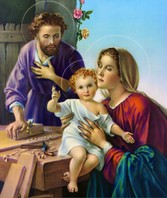 Christmas is on Friday. Wait, really?! Have we bought all of our presents? Are we ready for a Christmas feast? Is work ever going to end? These are the thoughts that plague us right now, but what we really should be asking is: are we ready for the birth of Christ? Advent is almost over - was there really enough time to prepare for the birth of the Son of God? The short is answer is 'no,' and the long answer is still 'no.’ But we know that as we prepare each liturgical year we take another step on the long journey toward Christ. Each celebration gives us the chance to refocus on that journey and draws us back into living out our faith wholly and fully. Who better to help us refocus our sight on Christ than the Holy Family? The Holy Family is the PERFECT example for us as we share in similar struggles. Through the Incarnation, Jesus became man and we believe him to be both fully human and fully divine. In a beautiful way his humanity is formed by Mary and Joseph. Who better to relate to then Mary and Joseph themselves? They were there when they thought Jesus was lost in the temple and there throughout his adolescence. Mary was there to inspire him to begin his ministry at Cana and was there as her son gave up his life for us. During Advent and Christmas we are watching Mary, Joseph, and Jesus grow and become a family. We should take this opportunity to allow ourselves to walk in their footsteps and live a life wholly committed to Christ. We should take this opportunity to ask for their intercession and assistance on our journey to God. Please do not think that their example only applies to families! Their example applies to each and every Catholic, Christian, non-Christian, and human being. The virtues that they live in the Bible are virtues that we should all be living. Look to how Mary and Joseph interact and form Jesus and open yourself up to them. No matter where we are in life we can learn from their unwavering commitment and their steadfast love. I challenge you to think about someone in your life who embodies these qualities: “unwavering commitment” and “steadfast love.” I only have to think back to last week at my father-in-law’s funeral. My wife was delivering the eulogy and said, “[he] reminded me of the importance of the ‘virtue of selfishness,’ as he so called it. This means that you can take control of how you feel, and you must take care of yourself so that you can take care of others. If you have nothing to give, what then are you authentically giving?” He got it. He understood that God is calling us to form ourselves in our faith, to root ourselves in him because we cannot lead others to God without first opening ourselves to his grace. How do we do this? We commit ourselves to Christ with steadfast love. This Advent, as we are preparing for the birth of Christ, let us remember to ground ourselves in his love so that as the new year comes we can go out and evangelize the world. Let us also remember Saint Pope John Paul II’s words on the Holy Family: “I wish to invoke the protection of the Holy Family of Nazareth…it is therefore the prototype and example for all Christian families…St. Joseph was a “just man”…may he always guard, protect and enlighten families. May the Virgin Mary, who is the Mother of the Church, also be the Mother of “the Church of the home”…May Christ the Lord, the Universal King, the King of Families, be present in every Christian home as He was at Cana, bestowing light, joy, serenity, and strength”. Nicholas Shields is a young professional working in Washington, DC.
Some time ago, I wrote about the Hallelujah Chorus from Handel’s Messiah. I mentioned how often times we hear that piece performed around Christmastime, although that portion of the Messiah is actually about Easter and the Resurrection. Now that the Nativity has arrived, perhaps it might be interesting to look at what Handel did use to interpret the Birth of Christ.
“For Unto Us a Child is Born” is taken from the words of the prophet Isaiah (Is 9:6): For unto us a Child is born Unto us a Son is given And the government Shall be upon His shoulder And his name shall be called Wonderful Counselor The Mighty God The Everlasting Father The Prince of Peace In that one verse, the prophet presents so much insight into the aforementioned Child to be born. He will be a son, he shall reign over a great dominion, and he shall bring peace. Well, only one child fits that description: Jesus Christ. When Isaiah tells of a son being given to the faithful, he is not just talking about the neighbor’s kid. He foretells of a son presented as a gift to all who believe. And indeed, in Christ, we have not only a child but also the moment when the word became flesh and dwelt among us (Jn 1:14). And through that word, humanity is redeemed. Through Christ, death no longer has power. The gates of heaven are opened to all that would follow he who is called the Son of God. “The kingdom of heaven is at hand,” declared John the Baptist (Mt 3:2). Yes, we believe that at the end of time Christ will establish his kingdom for all eternity (CCC 1042). But in the meantime, his kingdom exists on earth in the form of the one, holy, catholic, and apostolic Church (CCC 763). Founded by Jesus with a mission to manifest the will of God, the Church waits in hopeful anticipation for the establishment of Christ’s eternal reign. It is very appropriate, then, for Isaiah to foretell a Prince of Peace. Not only would Jesus go on to proclaim a kingdom of love but also, when he returns, establish a heavenly domain that knows no end. At Christmas, we celebrate both a beginning and an end. We celebrate the very beginning of Christ ruling the hearts and minds of the faithful while also looking toward the end when he will come again and his “kingdom will have no end.” Victor David is a collaborator with the Catholic Apostolate Center and a staff member at The Catholic University of America in Washington, DC. 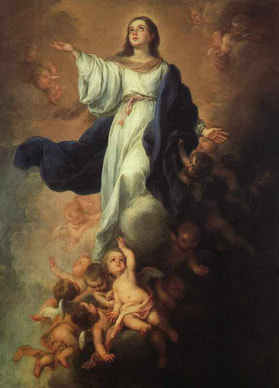 On November 1, 1950, Pope Pius XII issued the Apostolic Constitution Munificentissimus Deus (The Most Bountiful God) which declared “the Immaculate Mother of God, the ever Virgin Mary, having completed the course of her earthly life, was assumed body and soul into heavenly glory.” In doing so, Pope Pius defined for all time that the Assumption is a belief of the Catholic faith (cf. CCC, 966). And though the decree itself is only sixty-four years old, it succinctly shows that the belief spans all the way back to the beginnings of the Christian tradition. But what are the implication of this teaching and its feast day for the everyday faithful? First of all, it further illustrates Mary’s importance not only for Catholics but also for all mankind. This feast is but another way in which the Church honors the vessel that brought the Messiah into the world. It is through Mary that the human race received its savior. Therefore, one can see her Assumption into Heaven as a beautiful gift given to her by God. After living a truly exemplary life of faithfulness and love, God saw fit to bring her body and soul into paradise where, as PopePius puts it, “as Queen, she sits in splendor at the right hand of her Son, the immortal King of the Ages.” The Virgin’s Assumption, however, is also a gift to the faithful.The Holy Father writes, “while the illusory teachings of materialism and the corruption of morals…threaten to extinguish the light of virtue and to ruin the lives of men by exciting discord among them, in this magnificent way all may see clearly to what a lofty goal our bodies and souls are destined.” Mary was the first disciple of Jesus; she was the perfect disciple of Jesus. At the Wedding at Cana, she tells the servers, “Do whatever He tells you.” This is the same kind of trust all the faithful should try and emulate. And, after living a model life, she was gifted with her body and soul being brought up to Heaven. That is exactly the same hope that all Catholics (should) share. The Nicene Creed sums it up quite well: “He will come again in glory to judge the living and the dead and his kingdom will have no end…I look forward to the resurrection of the dead and the life of the world to come.” Catholics believe that at the end of time itself, when Christ comes to “render to each man according to his works, and according to his acceptance or refusal of grace,” all the dead will be resurrected (cf. CCC, 682). Those who enter Heaven will be restored, body and soul, to the gloried beings they were always meant to be before the Fall. Thus, the Assumption of Mary is not just a one-time occurrence, but rather a foretaste of what will happen at the end of days. It was not only a gift to the Blessed Mother, but also a gift to mankind. Humanity received a glimpse into what lies ahead for those who follow the example of a woman who put her whole heart, her whole faith, and her whole being into the care of a man she knew as her son and the Son of God. Victor David is a Collaborator with the Catholic Apostolate Center and is a staff member at The Catholic University of America, his alma mater, in Washington, D.C. He is a member of the Catholic University Knights of Columbus. Tomorrow, we arrive at Christmas Eve. In the rush of all of the “things we must do” do we stop and reflect on the one who is the true must for us, the Incarnate Son of God, Our Lord Jesus Christ? Stop for a moment and look at a Nativity scene. I mean really look. What do you see? Do you see simply art, or a depiction of a past event, or do you see the one who is the Incarnate Son of God? Our God, who created us, came to us, is with us, is for us, to save us! We are not alone in the vast universe, left adrift. No, our God came to us in a way that we would not expect of one who is all-powerful, he came in the innocent helplessness of a baby. This baby was not born in a palace or even a house, but in a borrowed spot out back where only animals lived. The first people who visited him and his parents were not friends and family, but poor shepherds. The King of Kings came as the Poorest of the Poor. He came to save us not just in the future, but now. We are to assist him in his mission as the third verse of the
Christmas carol “O Holy Night” tells us: Truly He taught us to love one another; His law is love and His gospel is peace. Chains shall He break for the slave is our brother; And in His name all oppression shall cease. Sweet hymns of joy in grateful chorus raise we, Let all within us praise His holy name. Like the shepherds and all who have gone before us in faith, our encounter with the Prince of Peace offers us the opportunity to be freed from all that oppresses us in life and the mandate to help others to find this freedom. As Pope Francis teaches us: “The joy of the gospel fills the hearts and lives of all who encounter Jesus. Those who accept his offer of salvation are set free from sin, sorrow, inner emptiness and loneliness. With Christ joy is constantly born anew… I invite all Christians, everywhere, at this very moment, to a renewed personal encounter with Jesus Christ, or at least an openness to letting him encounter them; I ask all of you to do this unfailingly each day. No one should think that this invitation is not meant for him or her, since “no one is excluded from the joy brought by the Lord.” (Evangelii Gaudium, 1, 3). This Christmas and always, our prayer as the team of the Catholic Apostolate Center is that your encounter with Christ today and every day brings such joy that you must share it with all! Blessed Christmas! Fr. Frank Donio, S.A.C. is the Director of the Catholic Apostolate Center |
Details
Archives
July 2024
Categories
All
|
About |
Media |
© COPYRIGHT 2024 | ALL RIGHTS RESERVED

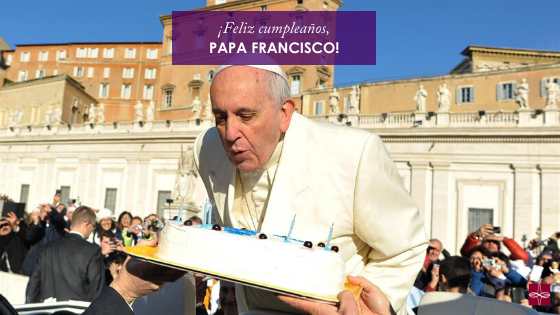

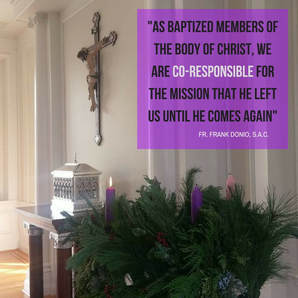
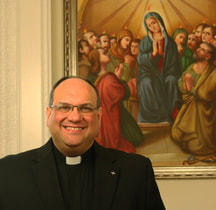
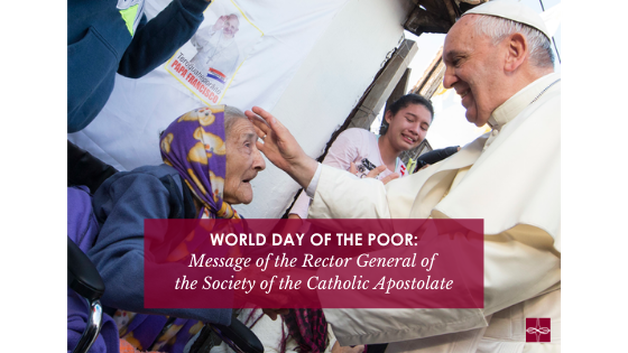
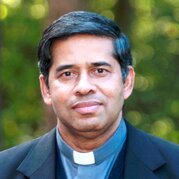
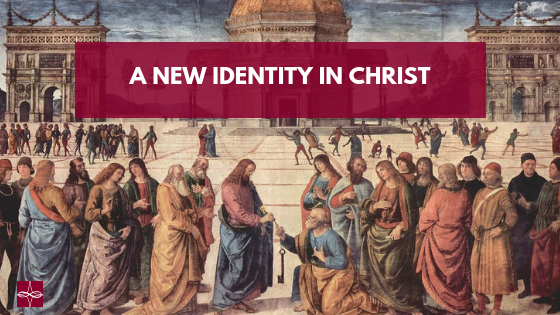

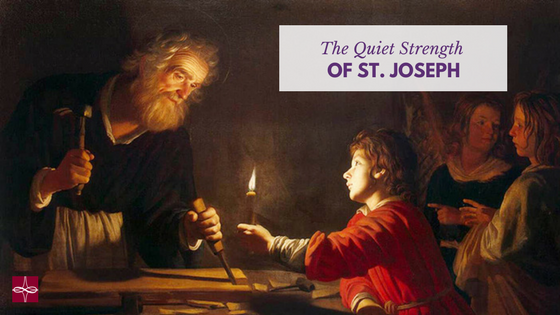

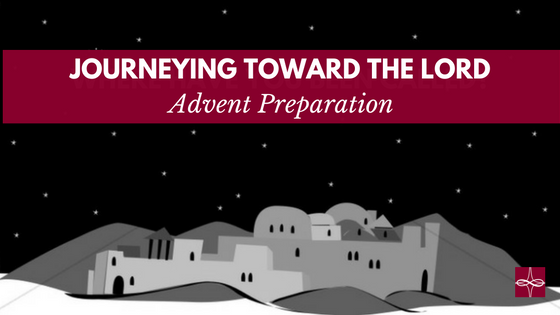
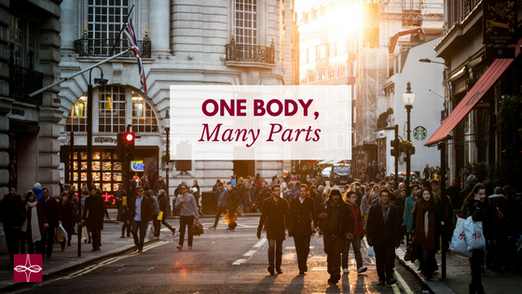

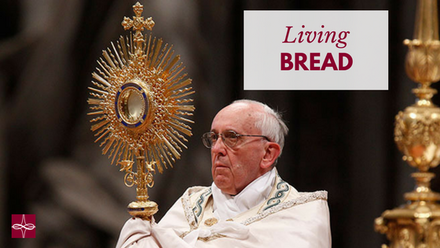

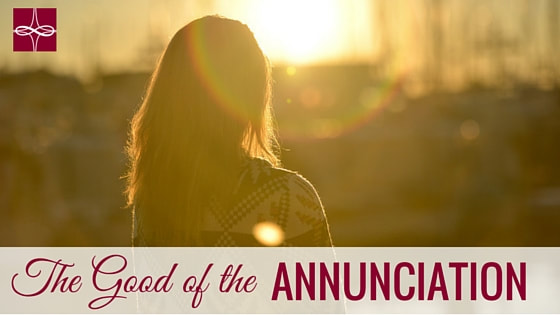

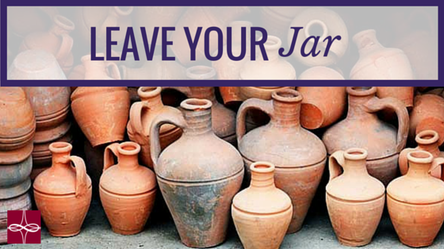

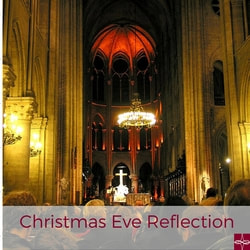
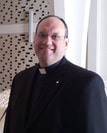
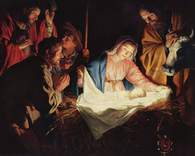
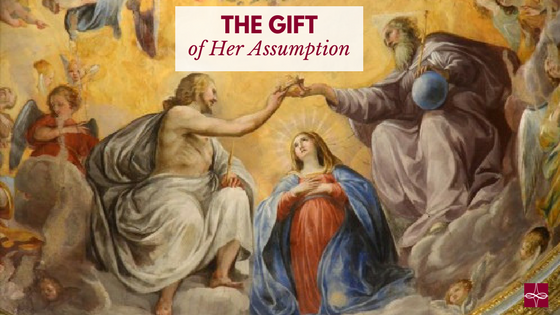
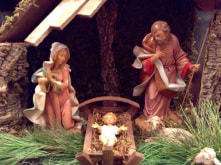
 RSS Feed
RSS Feed